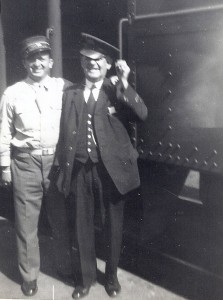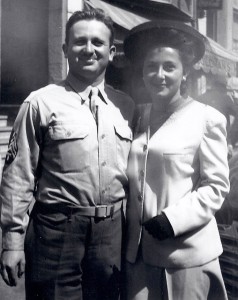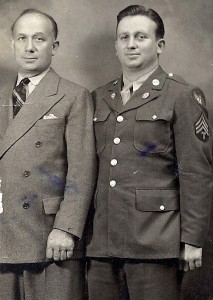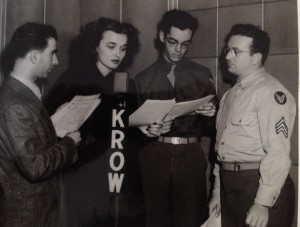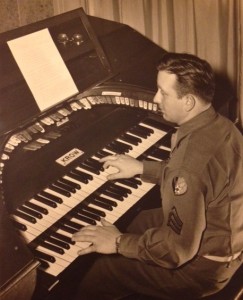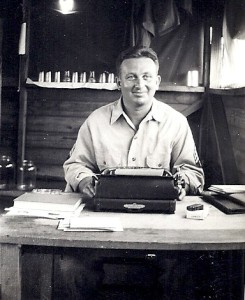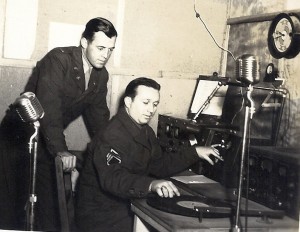Many, many years ago, my dad and I took my kids to Sacramento to visit the train museum. The museum has pictures of trains, train parts, memorabilia about the construction of the railroads in California (boring to the kids, but cool for the adults), and a number of actual cars you could go in. One of these cars had been in use as part of a troop train during WWII, taking the new recruits to boot camp.
My dad stopped next to this car and struck up a conversation with the docent, a man of about the same age. Dad said, “The last time I was on one of these it was courtesy of Uncle Sam.” The docent replied, “Me too.”
And from there they started asking each other questions: Where did you do your basic training? When did you go in? Where ‘d you go?” They established an immediate rapport and kept talking until one of the kids started tugging us to go look at something else. I was struck by how two strangers immediately found common ground, based on their military experiences during war time.
My dad loved to tell selected stories about his days in the service.
I’m a little fuzzy on all the details, but I’ve been able to piece a few things together.
When he enlisted in the Army Reserves, around 1941, he became a member of the Signal Corps, which meant he trained in several different locations, including Georgia, Florida, California and New Jersey. The Signal Corps “develops, tests, provides, and manages communications and information systems support for the command and control of combined arms forces.” Dad was trained as a radar repairman, theoretically out of harm’s way. Then he learned that the radar guys go ahead of the infantry to set things up. More than he’d bargained for!
While he was stationed in Florida, the call went out for musicians to perform in the weekly shows on base. He tried out, got the gig. Then they said, “And we need writers too.” So he joined a group of extremely talented guys who created and performed skits and musical numbers for these shows.
The Army moves in mysterious ways, and so my dad also ended up doing radio broadcasts at KROW, a radio station in Oakland, CA. Those stripes (“three up, three down”) indicate he was a Sergeant.
So, instead of wielding a weapon, he ended up writing and performing skits during the war years. The creative group he was part of helped keep the troops laughing at the comedies or engaged in the melodramas.
I did a little poking around online and discovered that radio station KROW used to be in a building on the corner of Broadway and 19th St. in the city where I live.

Notes from the Bay Area Radio Museum’s web site about the station: “Several notable personalities toiled at KROW during its residence at 464 19th Street, including Don Sherwood, Dick Whittington. . . Rod McKuen (later a renowned poet) and an Alameda housewife-turned-administrative assistant named Phyllis Diller, who would rise to much greater acclaim as a caustic comedienne.” Rod McKuen and Phyllis Diller?! Who knew?
I’m not sure where this picture was taken, but I love this shot of him in a barracks somewhere, composing at the keyboard. Looks like he was enjoying the work.
In 1945-46, he was stationed in the Philippines, Okinawa, and a couple of cities in Japan. Goooood morning, Fukuoka!I
He stayed in Japan for a while after the war ended, doing work that had to do with more technical aspects of radar, involving transmitters and other stuff.
My dad’s Army days were a time of exploration and hope while doing what he was assigned to do for the war effort. At the same time, he made lifelong friends who corresponded with each other religiously. Lou, Sheldon, Sol, Roy, Ed and Al became household names to me and my sister when we were growing up. Some of them realized their Broadway dreams, and some found long careers as writers and illustrators. My dad became a high school drama teacher–later a Professor at San Francisco State University–and had a fulfilling career teaching acting, directing and improv to young actors. He carried with him a few favorite expressions from those radio days. If you asked him what time it was, he would always answer: “By the clock on the studio wall, it’s 3:30.”
For my dad’s 80th birthday, Roy Doty—Army buddy, illustrator and cartoonist—created a special drawing for him. It depicted a young soldier on his bunk, daydreaming about what he’d do after the war. In thought balloons over my dad’s head were visions of his name in lights over Broadway: “Written and directed by Sam Elkind!,” a Pulitzer prize, a beautiful wife, and babies (with a question mark!): a picture of my dad as a young man.
The carefully folded flag given to families of veterans is in my closet, along with letters my grandfather sent to Dad during boot camp. I also have his ribbons, three of them, and one medallion with an eagle perched in the middle, surrounded by the words “Efficiency, Honor, Fidelity.” He gave them to me long ago–and let me wear his Army jacket during my hippie days.
Not all of his big dreams came true, but enough of them did, I think. My dad was proud and grateful for the opportunity to serve his country—both on the ground and over the airwaves.

